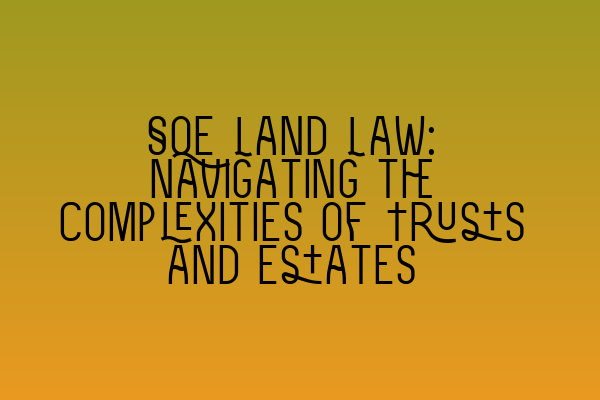SQE Land Law: Navigating the Complexities of Trusts and Estates
Welcome to SQE Property Law & Land Law, where our team of solicitors specialize in helping clients navigate the complex world of property law. In this blog post, we will focus on one specific aspect of land law: trusts and estates.
Trusts and estates are legal arrangements that allow individuals to distribute their assets and manage their affairs both during their lifetime and after their passing. It is crucial to understand the intricacies of trusts and estates, as they can have a significant impact on property ownership and inheritance.
Understanding Trusts
A trust is a legal mechanism that allows an individual, known as the settlor, to transfer their assets to a trustee, who holds and manages the assets on behalf of the beneficiaries. Trusts can be created for various purposes, including estate planning, charitable giving, and asset protection.
There are several types of trusts, each with its own characteristics and legal implications. These include:
- Express Trusts: These trusts are created intentionally by the settlor and can be established through a written document such as a trust deed. Express trusts are commonly used for estate planning purposes, allowing individuals to control the distribution of their assets.
- Implied Trusts: Implied trusts are created by the court based on the conduct and intentions of the parties involved. They typically arise in situations where the legal owner of property holds it on behalf of another, known as the beneficial owner.
- Constructive Trusts: Constructive trusts are created by the court to prevent unfairness or unjust enrichment. They are often used to remedy situations where a person has acquired legal ownership of property through improper means.
- Bare Trusts: Bare trusts are simple trusts where the trustee holds the property for the beneficiary’s benefit, with no discretion or control. They are commonly used for holding assets for minors or individuals with limited legal capacity.
When dealing with trusts, it is essential to understand their legal implications and ensure compliance with the relevant legislation. Our team of solicitors at SQE Property Law & Land Law can guide you through the intricacies of trust law, providing expert advice and assistance tailored to your specific needs.
Managing Estates
An estate refers to an individual’s total assets, including real estate, personal property, financial holdings, and any other valuable possessions. Managing an estate involves the proper administration and distribution of these assets, which is often a complex and time-consuming process.
When a person passes away, their estate goes through a legal procedure known as probate. Probate involves validating the deceased’s will (if any), paying outstanding debts and taxes, and distributing the remaining assets to the beneficiaries. It is vital to ensure proper estate planning to minimize potential disputes and maximize the value of the estate.
At SQE Property Law & Land Law, our solicitors have extensive experience in estate administration, from drafting wills and creating trusts to guiding clients through the probate process. We understand the sensitive nature of estate matters and work closely with our clients to develop personalized strategies that align with their wishes and protect their assets.
Contact SQE Property Law & Land Law Today
If you require assistance with trusts, estates, or any other property law matters, do not hesitate to contact SQE Property Law & Land Law. Our team of solicitors combines expertise in property law, years of experience, and a client-centered approach to provide the best possible legal solutions.
For more information about our services, browse our website or contact us directly. We are here to help you navigate the complexities of trusts and estates, ensuring you make informed decisions and protect your assets for the future.
Related Articles:
